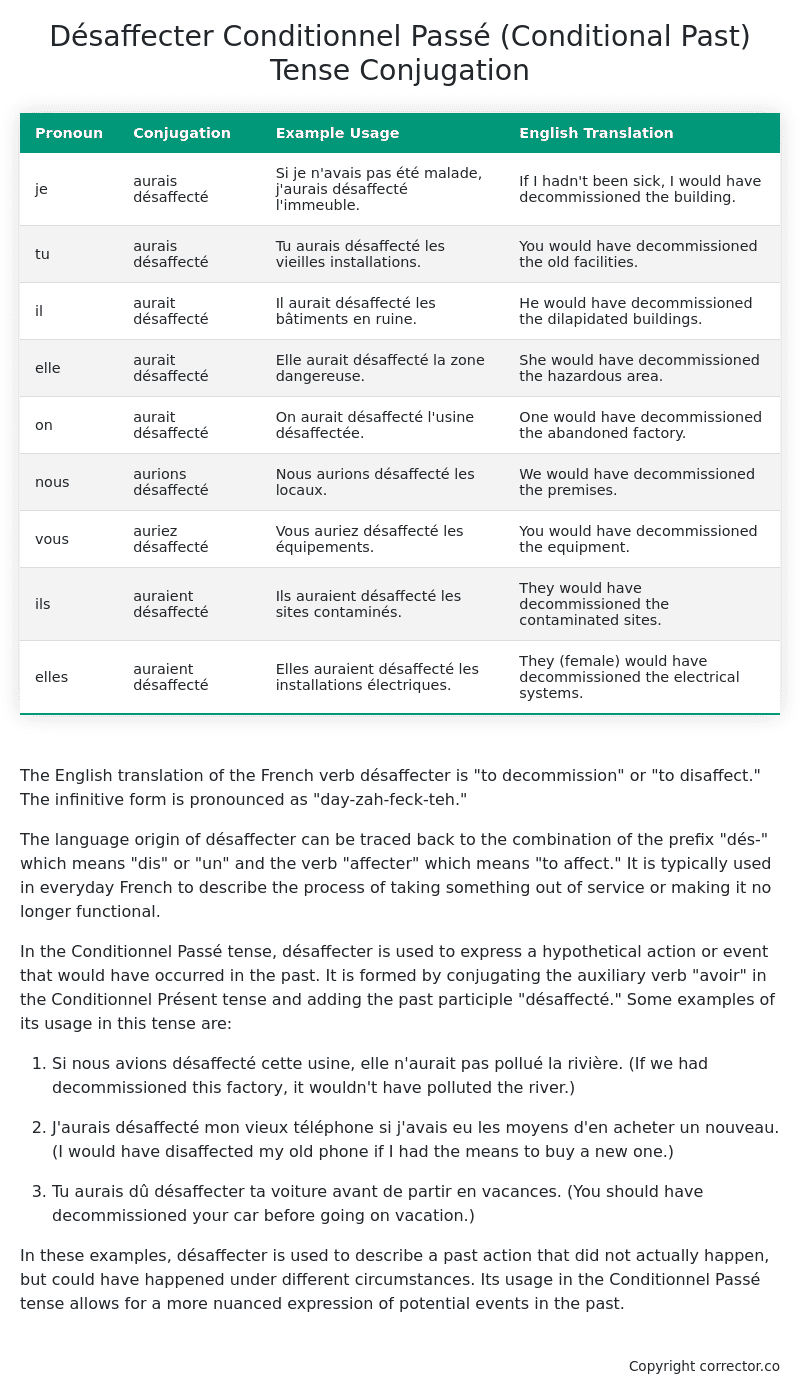Conditionnel Passé (Conditional Past) Tense Conjugation of the French Verb désaffecter
Introduction to the verb désaffecter
The English translation of the French verb désaffecter is “to decommission” or “to disaffect.” The infinitive form is pronounced as “day-zah-feck-teh.”
The language origin of désaffecter can be traced back to the combination of the prefix “dés-” which means “dis” or “un” and the verb “affecter” which means “to affect.” It is typically used in everyday French to describe the process of taking something out of service or making it no longer functional.
In the Conditionnel Passé tense, désaffecter is used to express a hypothetical action or event that would have occurred in the past. It is formed by conjugating the auxiliary verb “avoir” in the Conditionnel Présent tense and adding the past participle “désaffecté.” Some examples of its usage in this tense are:
-
Si nous avions désaffecté cette usine, elle n’aurait pas pollué la rivière. (If we had decommissioned this factory, it wouldn’t have polluted the river.)
-
J’aurais désaffecté mon vieux téléphone si j’avais eu les moyens d’en acheter un nouveau. (I would have disaffected my old phone if I had the means to buy a new one.)
-
Tu aurais dû désaffecter ta voiture avant de partir en vacances. (You should have decommissioned your car before going on vacation.)
In these examples, désaffecter is used to describe a past action that did not actually happen, but could have happened under different circumstances. Its usage in the Conditionnel Passé tense allows for a more nuanced expression of potential events in the past.
Table of the Conditionnel Passé (Conditional Past) Tense Conjugation of désaffecter
| Pronoun | Conjugation | Example Usage | English Translation |
|---|---|---|---|
| je | aurais désaffecté | Si je n’avais pas été malade, j’aurais désaffecté l’immeuble. | If I hadn’t been sick, I would have decommissioned the building. |
| tu | aurais désaffecté | Tu aurais désaffecté les vieilles installations. | You would have decommissioned the old facilities. |
| il | aurait désaffecté | Il aurait désaffecté les bâtiments en ruine. | He would have decommissioned the dilapidated buildings. |
| elle | aurait désaffecté | Elle aurait désaffecté la zone dangereuse. | She would have decommissioned the hazardous area. |
| on | aurait désaffecté | On aurait désaffecté l’usine désaffectée. | One would have decommissioned the abandoned factory. |
| nous | aurions désaffecté | Nous aurions désaffecté les locaux. | We would have decommissioned the premises. |
| vous | auriez désaffecté | Vous auriez désaffecté les équipements. | You would have decommissioned the equipment. |
| ils | auraient désaffecté | Ils auraient désaffecté les sites contaminés. | They would have decommissioned the contaminated sites. |
| elles | auraient désaffecté | Elles auraient désaffecté les installations électriques. | They (female) would have decommissioned the electrical systems. |
Other Conjugations for Désaffecter.
Le Present (Present Tense) Conjugation of the French Verb désaffecter
Imparfait (Imperfect) Tense Conjugation of the French Verb désaffecter
Passé Simple (Simple Past) Tense Conjugation of the French Verb désaffecter
Passé Composé (Present Perfect) Tense Conjugation of the French Verb désaffecter
Futur Simple (Simple Future) Tense Conjugation of the French Verb désaffecter
Futur Proche (Near Future) Tense Conjugation of the French Verb désaffecter
Plus-que-parfait (Pluperfect) Tense Conjugation of the French Verb désaffecter
Passé Antérieur (Past Anterior) Tense Conjugation of the French Verb désaffecter
Futur Antérieur (Future Anterior) Tense Conjugation of the French Verb désaffecter
Subjonctif Présent (Subjunctive Present) Tense Conjugation of the French Verb désaffecter
Subjonctif Passé (Subjunctive Past) Tense Conjugation of the French Verb désaffecter
Subjonctif Imparfait (Subjunctive Imperfect) Tense Conjugation of the French Verb désaffecter
Conditionnel Présent (Conditional Present) Tense Conjugation of the French Verb désaffecter
Conditionnel Passé (Conditional Past) Tense Conjugation of the French Verb désaffecter (this article)
L’impératif Présent (Imperative Present) Tense Conjugation of the French Verb désaffecter
L’infinitif Présent (Infinitive Present) Tense Conjugation of the French Verb désaffecter
Struggling with French verbs or the language in general? Why not use our free French Grammar Checker – no registration required!
Get a FREE Download Study Sheet of this Conjugation 🔥
Simply right click the image below, click “save image” and get your free reference for the désaffecter Conditionnel Passé tense conjugation!

Désaffecter – About the French Conditionnel Passé (Conditional Past) Tense
Formation
Common Everyday Usage Patterns
Expressing Unreal Past Scenarios
Polite Requests or Suggestions
Expressing Doubt or Uncertainty
Interactions with Other Tenses
Conditional Present
Indicative Past Tenses
Conditional Future
Summary
Want More?
I hope you enjoyed this article on the verb désaffecter. Still in a learning mood? Check out another TOTALLY random French verb conjugation!


